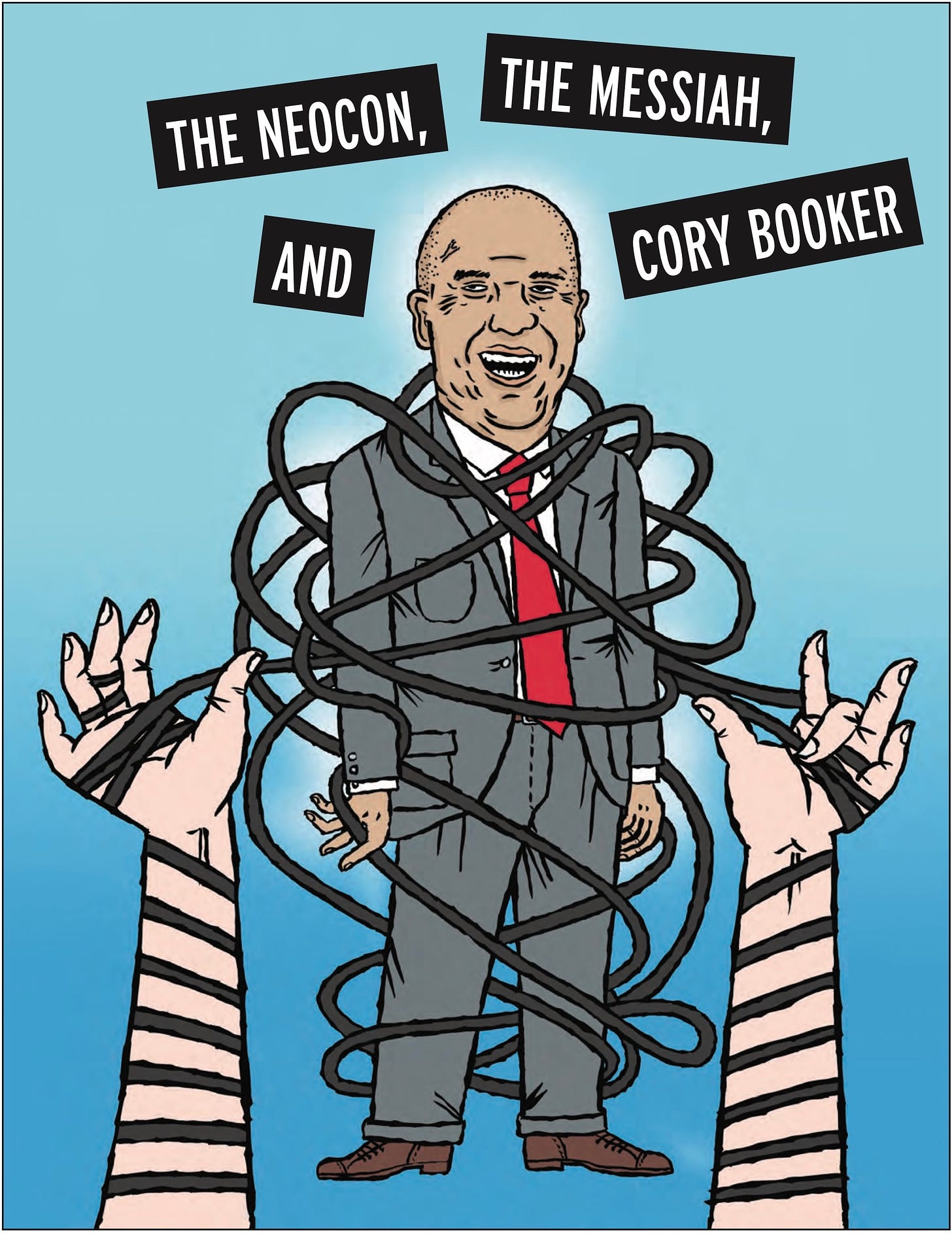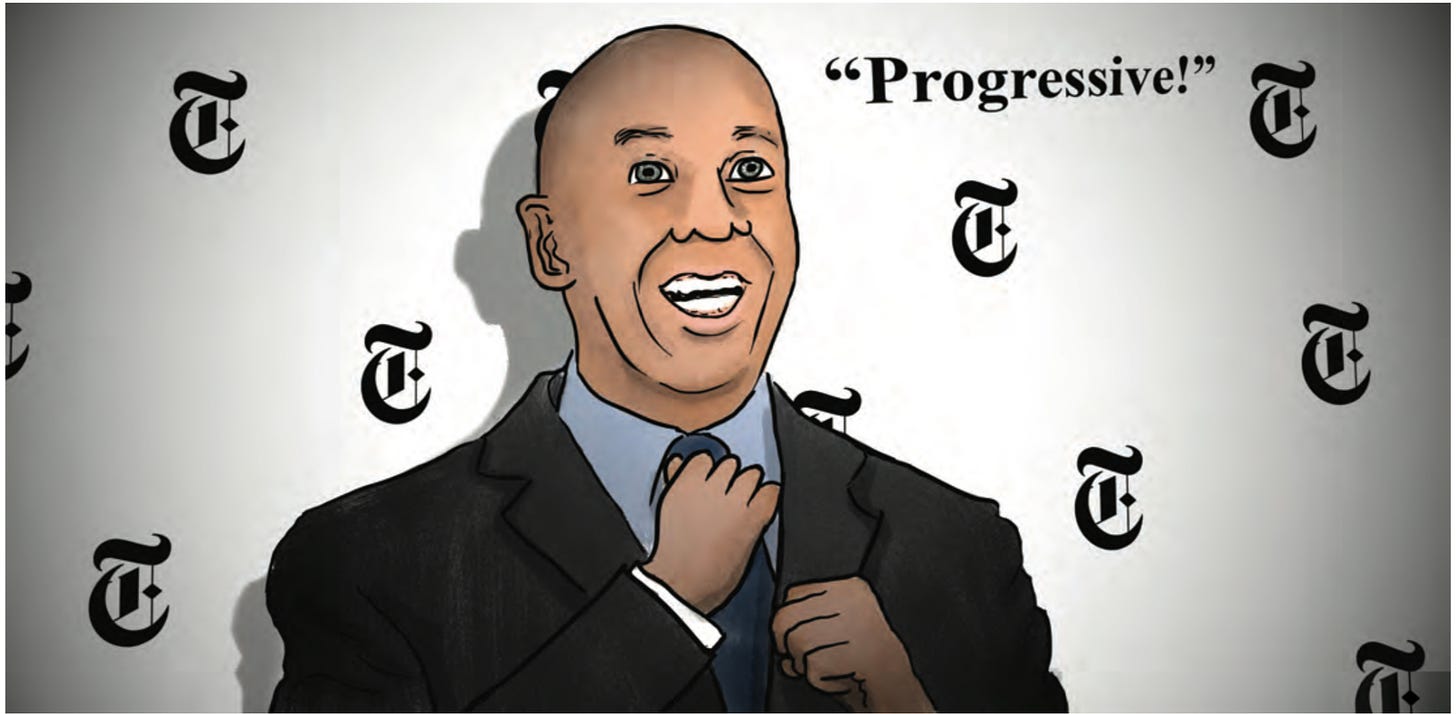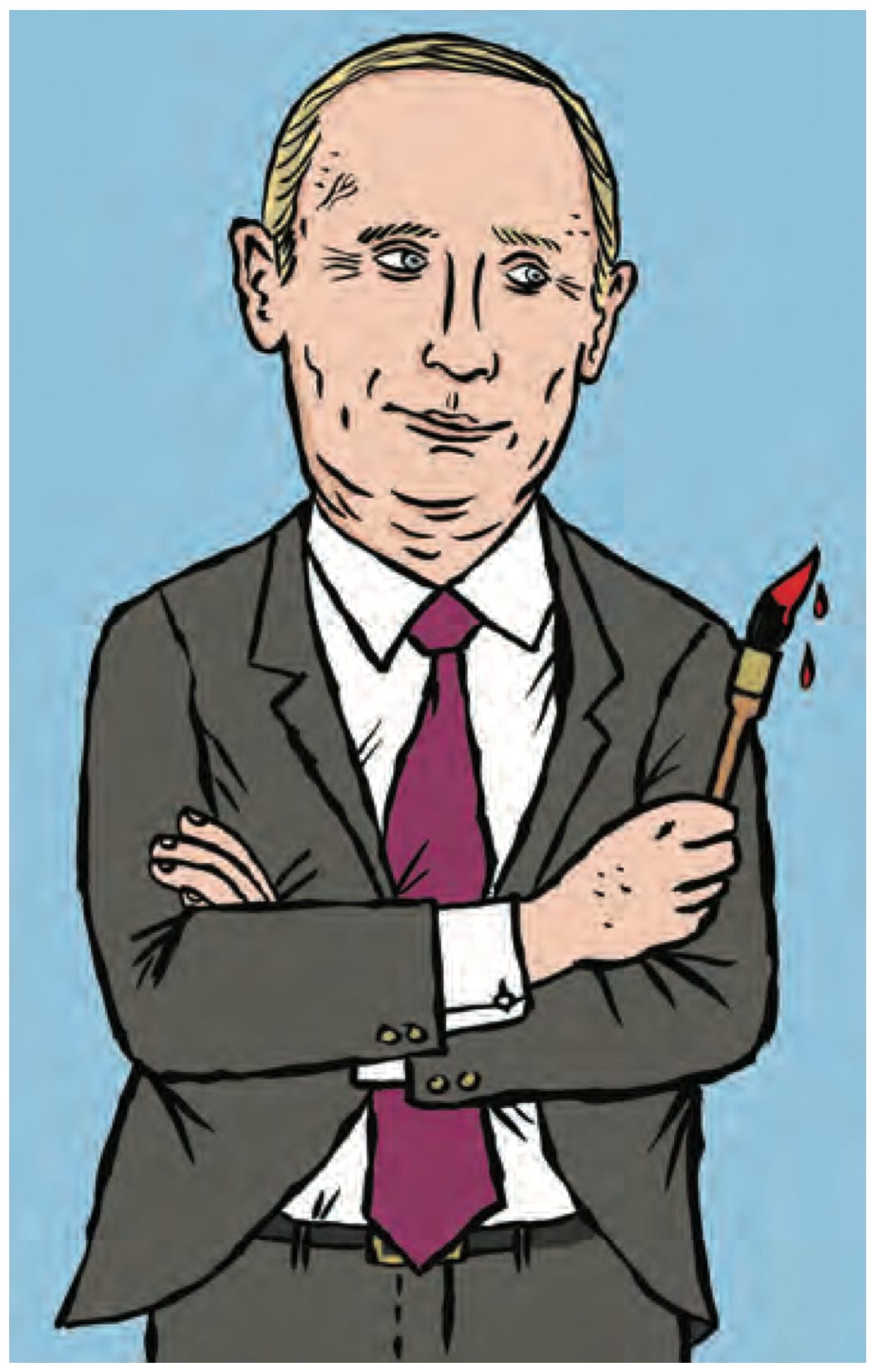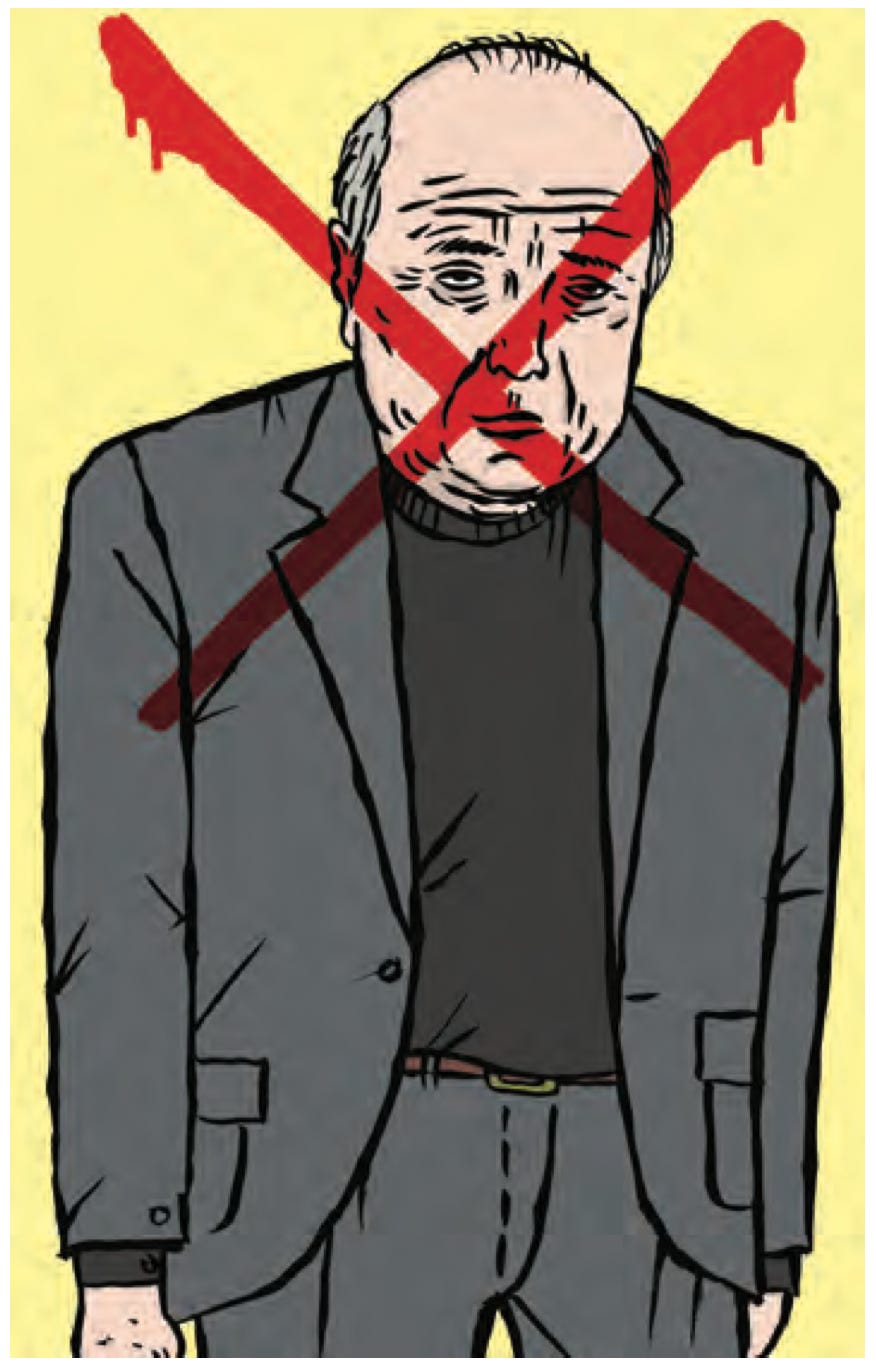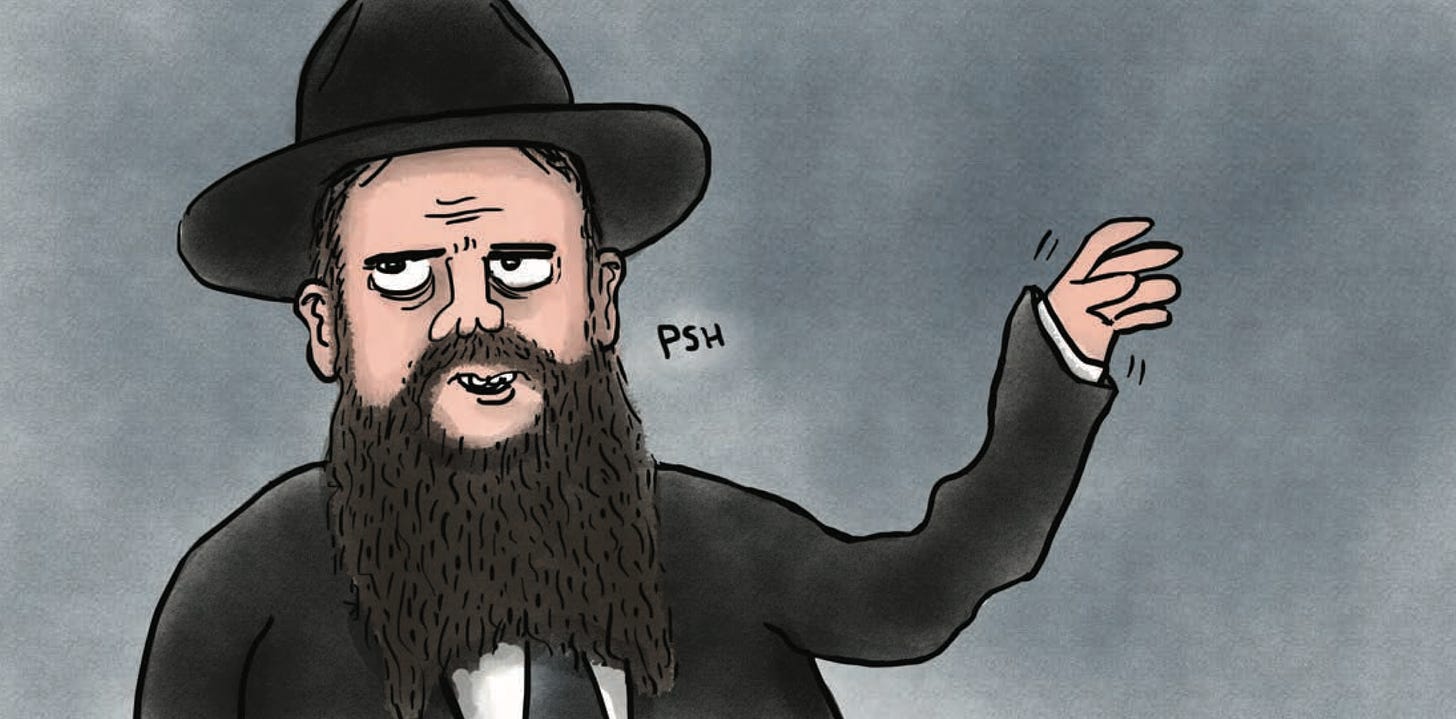The weird world of Chabad, an influential Hasidic sect that’s been taking America (and Israel) by storm
Chabad represents the cutting edge of Zionist Jewish life in America — a movement that draws disillusioned Jews from progressive and liberal corners of Judaism and funnels them to the right.
In 2013, when I was a reporter at the incredible-but-now-deceased NSFWCORP, Cory Booker was gunning for the Senate. He was an up and coming neoliberal star politician back then. And to America’s liberal media and political class, Booker represented a bright new hope for the future. But there was a weird, little-known side to Booker’s meteoric rise: his political career got going largely because of support from Chabad, an old Jewish religious sect that originated in the 18th century in a village in modern day Belarus:
Chabad is a fascinating and kinda scary movement.
While a lot Jews in the west drift away from the bankrupt integrationist world of conservative and reform Judaism and settle into a totally secular identity, a lot of Jews also drift towards Chabad — a sect that to purports to give modern Jews a much more “real” and zealous and religious experience. Because of its extreme recruitment efforts — it spends awesome amounts of energy and resources to convert non-Chabad Jews to Chabadism — the sect went from being fringe just a few decades ago to blowing up as one of the main Jewish religious movements in America today.
How pushy are Chabad members about roping in non-practicing Jews into their sect? Consider that a psychiatrist I went to in Los Angeles for my meds — who happened to be a member of Chabad — tried to convert me right there in the office. I had just moved back to California from Moscow and every time I’d go in to see him, he’d push me hard to attend Chabad events — “you could meet people and make friends.” I’d brush it off because I wanted the meds. But I was shocked at his behavior. A psychiatrist was pushing his patient into joining a religious cult. And, according to certificates he had hanging in his office, he billed himself as an expert on cults and deprogramming. What a great, ethical guy!
Here in the states, Chabad tries to sell itself to outsiders as a moderate, almost unpolitical movement. In Israel, it lets its full genocidal, law-of-the-bible worldview fly right in the open. And it’s been a huge player in the extreme-rightwing drift of Israel’s already extreme rightwing politics. But Chabad isn’t just a big deal in America and Israel, it’s been taking over Jewish religious and cultural life all around the world — including the former Soviet Union, where I had plenty of contact with it as a young stringer for the Jewish Telegraphic Agency years ago.
Anyway, when I found out about Chabad’s role in Booker’s political career, I decided to do a deep dive into Chabad and its history.
Today Chabad represents the cutting edge of Zionist Jewish life in America — a movement that draws disillusioned Jews from progressive and liberal corners of Judaism and funnels them to the Zionist right. And my sense is that the movement is only gonna exert more and more power as the liberal Zionist consensus collapses here in America.
Chabad is important to know, so I figured I’d try rescue my reporting from the gaping memory hole of the Internet. Check it out!
—Yasha Levine
The Neocon, The Messiah, and Cory Booker
Yasha Levine • NSFWCORP • August 25, 2013
“The difference between a Jewish and a non-Jewish person stems from the common expression: ‘Let us differentiate’ ...between totally different species.”
—The Chabad-Lubavitcher Rebbe
Cory Booker, the Democratic candidate for New Jersey Senator, has been endorsed by the New York Times as the next progressive hope...a younger, more populist version of Barack Obama, a guy who’s not afraid to get down and dirty. The Times’ op-ed wizards described Booker as a “deeply unconventional politician,” known for “once rushing into a burning house before the fire department arrived— saving a woman and traumatizing his security detail,” and they predicted that he “will be able to use his political star status to fight for the neglected, the powerless, people who are working and people who need to work in New Jersey and nationally.”
Unconventional indeed. But there’s one unconventional side to Booker’s progressivism that has received much less recognition. His political career was launched with the help of the Chabad-Lubavitchers, a right-wing Hasidic cult that considers its dead Rebbe a messiah and that pushes a regressive right-wing worldview that would horrify Booker’s prog supporters: deep-rooted racism, violent Islamophobia, medieval positions on everything from abortion to homosexuality and women’s rights, and a nasty tendency to normalize sexual abuse and protect serial sexual predators in its ranks. In the early 1990s, Chabad’s passive-aggressive racism helped trigger a three-day race riot in Brooklyn. Earlier this year, a prominent Chabad rabbi mocked victims of childhood sexual abuse who went public, comparing their sexual abuse to “diarrhea” which is “embarrassing but it’s nobody’s business.”
Booker’s relationship with the sect goes back to the early ’90s, when he became an active member of Chabad outfits at Oxford and Yale. The connections he forged through Chabad have provided him with a wealthy and powerful right-wing donor network that helped seed his political career. But the relationship was more than a simple political alliance: Booker became mesmerized with Chabad’s teachings and began studying with Chabad rabbis. He now reads Hebrew, recites portions of the Torah from memory, helps Chabad fundraise and—most disturbingly—genuinely shares the sect’s messianic worldview. As Booker told a room full of wealthy Chabadnik funders in Morristown, New Jersey, back in 2000, when he was a just a lowly Newark council member:
“...the reason why I say that I am humbled to stand before you is that I am truly empowered by the Lubavitch movement, and specifically by a number of Lubavitcher rabbis I have come to know over the last few years. They helped me take seeds that were planted by my elders, my parents and my grandparents, and nurture them in a way that allowed those seeds to flourish and blossom into the kind of work to which I have dedicated my life.
“Right now, I am on the streets of Newark, battling what I think is one of the most important battles in the city, in this nation, to try to make the spirit of God alive and well. As one of my rabbi friends told me—to try to truly bring about, through effort and sweat, or whatever necessary—the Messianic Era.”
Yes, you read that right. Cory Booker, progressive star and likely future Senator of New Jersey, is “humbled” and “empowered” by Chabad, and helping “make the spirit of God alive and well ... to truly bring about ... the Messianic Era.”
What the hell is going on? Why is Booker throwing in with a far-right apocalyptic Jewish cult? And what does it say about his politics? To understand why Booker’s relationship with Chabad is so disturbing, you first have to understand what Chabad is all about.
The Chabad-Lubavitcher is a Hasidic Orthodox sect that originated in the late-18th century in a village on what is now the border between Russia and Belarus. One of many competing Hasidic right-wing biblical nonconformist sects, it differentiated itself by stressing the study of mystical Jewish texts. The sect expanded, battled other Jewish sects, opposed Napoleon, sucked up to the Czar, produced various religious texts and commentaries, and generally did what all Hasidic sects did at the time.
Things started to go bad in the 20th century. Chabad nearly went extinct, first losing power to modernism and secularization, then getting booted out of the Soviet Union and finally being decimated by the Nazis in WWII. Joseph Isaac Schneersohn—then-head of Chabad and the great-great-great- great-grandson of the guy who started the whole thing—escaped to Crown Heights in Brooklyn, where he began preaching that the end times were near.
Joseph Isaac’s son-in-law Menachem Mendel Schneerson—MMS, for short—took over the family racket and became “the Rebbe.” Rebbe took this messianism to a whole new level in that he saw himself as a messiah. The world was about to end, so it was imperative to prepare, which meant bringing secular Jews from America and around the world into the Chabad fold. The group began cobbling together a wide network of outreach centers, installing Chabad rabbis near college campuses and in remote communities, and making rabbis accessible and available for funerals, weddings and other Jewish rituals. Because Chabad’s regressive
Judaism would scare away most secular Jews, these outreach efforts presented
a softer, more tolerant and mainstream version of the faith. Chabad’s emissaries/missionaries became amazingly good at putting a modern, inclusive face on Chabad, and began to aggressively steal marketshare from Reform and Conservative Judaism. Professor Marvin Schick, an expert on Jewish education, described Chabad as the “Walmart of Jewish life, a mega- phenomenon that keeps growing at a remarkable rate by entering new and underserved areas, and by exploiting the vulnerability of existing service providers. Growth provides the impetus and resources for additional growth.”
But as it strengthened its mainstream credentials with the Jewish public, internally Chabadniks were hyper-radicalizing and becoming more and more messianic.
The Rebbe saw the collapse of the Soviet Union as a sign that apocalypse was at hand, that the old enemy of Chabad had finally been destroyed.
It also meant that millions of secular Russian Jews were now available and ripe for conversion. For weird reasons, Saddam’s invasion of Kuwait and the Gulf War were also seen as a sure sign of the end days. Chabad began to be associated more and more with evangelical Christians, right-wingers, Zionists and neocons.
By the ’90s, just about every prominent Chabad rabbi believed that the Rebbe was the messiah. Menachem Friedman, a Chabad scholar and professor at Bar-Ilan University, wrote in 1993, “Today, virtually all Chabad hasidim recognize the Rebbe as the messiah and no longer hesitate to express their views in public.” It was a view that took Chabad out of the orbit of traditional Orthodox Judaism and made it a heretical sect—sort of like Jews for Jesus.
But then, in 1994, the Rebbe died.
Apocalypse did not come, and most prominent Chabadnik rabbis began
to publicly deny they ever believed the Rebbe was the messiah. But after his death, Chabad’s messianic outreach and conversion activities only accelerated. Over the next two decades, the number of missionary Chabad families quadrupled. Something like 4,000 of them are now spread out in 1,000 cities around the world.
Chabad increased its presence most notably in the former Soviet Union.
I first learned about Chabad not long after my family immigrated to San Francisco from the Soviet Union in 1990. Like most secular Bay Area Jews, all I ever really knew about the Chabad-Lubavitchers was surface stuff: they lit a huge menorah every year
in Union Square, prowled the streets during Jewish holidays in outfitted RVs—“mitzvah tanks”—blasting Jewish techno music, and ran Shabbat dinners for UC Berkeley students, where I was told they pour plenty of wine and get everyone drunk. Oh and a Chabad rabbi in San Francisco managed to con a couple of my Soviet émigré buddies in San Francisco into getting circumcised when they were already in their late teens. From what they told me, it was painful as hell. But they did score a couple of Tower Records gift certificates in return.
But I really got up close and personal with the Chabadniks when
I was just starting out as an earnest gumshoe reporter nearly a decade ago. I had moved back to my native city of St. Petersburg in the mid-2000s, and had a side-gig freelancing for the Jewish Telegraphic Agency, a newswire service for mainstream American Jews. My gig put me in frequent contact with the Lubavitchers, and I was constantly weirded out and shocked by their sleazy, unethical behavior and their aggressive attempts to convert secular Jews into born-again Chabadniks.
By the time I arrived, Chabad had become the biggest and most powerful Jewish organization in Russia. No other religious Jewish outfit even came close to competing with it in terms of funding, political connections and sheer organizational energy. Its emissaries— usually family groups consisting of a young rabbi, his wife and their kids— were spread throughout something like 40 cities. Yep, Chabad was the undisputed King of Russian Jews, but not because it had succeeded on its merits or had been embraced by the locals. Nope, Chabad owed its influence and power to a cynical and sleazy deal it worked out with Vladimir Putin—a deal that went back to Putin’s war with the original, and mostly Jewish, Yeltsin-era oligarchs: Boris Berezovsky, Vladimir Gusinsky and everyone’s favorite oligarch-turned-political- prisoner Mikhail Khordorkovsky.
Back in the 1990s, in the Yeltsin era, a group of Jewish oligarchs led by Soviet-theater-director-turned-post-Soviet-media-baron Vladimir Gusinsky set up an umbrella organization to represent Russian Jews. Named the Russian Jewish Congress, it was created for one major purpose: to give Gusinsky and his fellow oligarchs a much-needed cloak of respectability. And it worked.
As the head of the RJC, Gusinsky was treated no longer just as a smart gangster and cut-throat businessman, but also as a respected leader of Russia’s Jewish community.
Gusinsky’s RJC revealed its usefulness in the early 2000s, when Putin began warring with the Yeltsin- era oligarchs who had initially put him in office. The fight was largely about political and economic power. Among other things, Putin wanted to put
the state — which meant himself and his clique — back in control of Russia’s resources: banking, media and energy. But that’s not how it was it was reported in the press. From the very beginning, newspapers framed it as an authoritarian struggle with heavy overtones of anti-Semitism. Putin wasn’t going after ruthless gangsters with blood on their hands. He was targeting Jewish community leaders! He was coming after the Jews!
That was how the Western press played Putin’s fight with the oligarchs, beginning with his arrest of Gusinsky in 2000. “Gusinsky arrest raises fears for Russia’s Jews,” blared a Telegraph headline in 2000.
“The harassment of Vladimir Gusinsky, the Jewish media magnate charged with embezzlement, is being linked to attempts by the Russian government to exacerbate a split among the country’s Jews and curb their influence in public life.
“...The World Jewish Congress in New York said Mr. Gusinsky’s arrest was part of a disturbing pattern of pressure against Jewish interests in Russia. It said: ‘The Jewish community has noted with distress the ongoing attacks by government-owned and other media against Gusinsky and the Russian Jewish Congress.’
“‘Russian Jewish leaders believe that this is just the start of a general move against groups that dare to be independent of the government.’ ‘They’ve started with the Jews because we’re the most vulnerable,’ said Alexander Osovtsev, vice-president of the Russian Jewish Congress. ‘We’re the first to be attacked, but we certainly won’t be the last.’”
Similar stories ran in papers around the world, international Jewish organizations expressed concern, U.S. and Israeli politicians said they’d get involved. In short, it was a PR nightmare for Putin. He needed someone from the Jewish world in
his corner, reassuring folks that anti-Semitism had nothing to do with his crackdown on Jewish oligarchs.
And that’s where Chabad came in. Not long after Putin took power, he worked out a deal. The organization would have to publicly and loudly support Putin’s policies, and defend him against charges of anti-Semitism. In return, it would receive lavish funding from two Putin-friendly oligarchs, and get the full support of the Russian government to operate in the Russian Federation. In short, Chabad would become Putin’s third- party spokesman. Or, as some called them, Putin’s Court Jews.
That deal was on full display in September 2000, a few months after Gusinsky was arrested on charges of embezzlement, when Putin showed up at a dedication ceremony for a brand- new Chabad community building in the center of Moscow. The facility was built with $12 million, mostly with funds from Roman Abramovich and Lev Leviav, two Jewish Putin-aligned oligarchs who would become instrumental in Chabad’s rise to dominance over the next few years. The ceremony, which was attended by American ambassador James Collin, was notable, The New York Times pointed out, “because Mr. Putin effectively gave a government blessing to the Chabad Lubavich movement.”
And Chabad gave that blessing right back. Rabbi Avraham Berkowitz, executive director of Chabad’s outfit in Russia, used his speech to praise Putin as a friend of the Jewish people and to dispel foolish talk about his anti-Semitism. The New York Times reported Berkowitz as saying, “We believe the government is not anti-Semitic, and we believe the government will help us to flourish and grow. The message here—to all minorities of all religions—is that they will be given the opportunity to grow in a new democratic Russia.”
Chabad officials who had been shipped in from the U.S. to run the outfit in Russia stuck to their end of the deal. They continued to praise and support Putin while he systematically took down, exiled and jailed insubordinate Yeltsin-era oligarchs: first Vladimir Gusinsky, then Berezovsky, and finally Mikhail Khodorkovsky and his business partner Platon Lebedev, both of whom are now serving long jail terms for tax evasion and fraud.
Boris Berezovksy, cancelled.
With Putin providing the political backing and Jewish Putin-friendly oligarchs providing the cash, Chabad became an unstoppable force in Russia’s ramshackle Jewish community. But success had a price. In 2005, Haaretz published a very detailed investigation into Chabad’s sudden rise in Russia. The paper revealed that the third-party advocacy deal Chabad officials had struck up with Putin wasn’t restricted to protecting him from charges of anti- Semitism. Chabad had also promised to milk its D.C. connections and act as covert lobbyists on behalf of Russia:
“...another reason for the close ties between the Putin government and FEOR [Chabad’s organization in Russia] lies in the promises made by Leviev and Lazar that they would make their connections available to Putin and assist the Kremlin to open doors in the corridors of power in Washington. Most importantly, they let Putin and his aides understand that their influence and lobbying would bring about the abolition of a 1974 Congressional amendment to the Trade Reform Act sponsored by Senator Henry Jackson and Representative Charles Vanik, both Democrats. Putin is deeply distressed by this legislation, which stipulates that countries, such as the former Soviet Union, which restrict freedom of movement and prevent the free emigration of their citizens will not receive special trade benefits from the United States. Even though the Jews of the former Soviet Union, and then Russia, were allowed to leave, the amendment has not been repealed.”
And Chabad kept its promise.
Just from the little information that’s publicly available, we know that the organization directly lobbied members of Congress and the Obama administration on multiple occasions. Chabad members also did a whole lot of general flack work promoting favorable trade legislation for Russia.
A 2007 Wall Street Journal investigation into links between Putin and Chabad characterized Chabad as little more than a lobby group: “On numerous trips to Washington, [Chabad’s Chief Russia Rabbi Berl Lazar] lobbied members
of Congress, made speeches and gave countless media interviews against the Jackson-Vanik amendment. That Cold War law, which curbed U.S. trade with nations restricting emigration, has long rankled the Kremlin,” reported the paper. And Chabad was still at it in 2009, directing its lobbying efforts at the Obama administration.
While Chabad reps were hitting the beltway lobbying circuit, their colleagues back in Russia were waging a war against the existing Jewish populace. In the course of my reporting, I met non-Chabad Jewish community leaders who were shocked and horrified by Chabad’s aggressive, unethical and sometimes straight up illegal attempts to strip other Jewish organizations of assets and property.
Here in the States, Chabad approaches its missionary attempt to convert and steal marketshare from non-Orthodox Jewish groups in less aggressive ways. But in Russia, it simply took what it wanted, using its political connections to raid and seize synagogues and other communal property in cities across Russia. That happened in the Siberian city of Omsk, where local chinovniki seized a synagogue that had been operated by a Reform Jewish organization since the 1990s and handed it over
to Chabad’s FEOR. The Wall Street Journalreported that this was done at the suggestion of Abramovich, who promised to increase funding for the community if it was handed over to Chabad, even though it was against the wishes of the community:
“Some congregants in Omsk were disappointed by the new direction. The town’s new rabbi, a Chabadnik from Israel, surprised them by organizing special celebrations in honor of the Rebbe, who died in 1994 but is still revered by Lubavitchers, who often hang portraits of him in their homes. ‘People here don’t really understand why we should have special prayers for the Rebbe’s birthday,’ says [Omsk’s Reform community leader] Mr. [Ilya] Edelshtein. ‘It feels like idolatry.’”
Chabad missionaries were just as unprincipled and sleazy in their fight for Russian Jewish souls as they were for Jewish property. Hell, they even tried to convert me into a born-again Chabadnik...
I remember one episode particularly well. I was in the southern Russian city of Volgograd—better known as Stalingrad—doing a human-interest story (well, more like a parody of a human-interest story) on a local Jewish kid who graduated from a local DJ school and now wanted to become the most famous techno DJ in the entire former Soviet Union. Yep, that was the hook. But hey, it wasn’t easy finding a Jew in Russia, so my editors at the Jewish Telegraphic Agency took what they could get.
Because the budding star of my profile, one DJ Tiësto, had attended a local Chabad school for a few years, I scheduled a meeting with the local Chabad missionary. The guy invited me over to talk in his apartment, a dingy concrete-panel Khrushev-era apartment building not far from Volga’s central district. The streets in the area were lined with beautiful stone Stalin-era buildings built by German prisoners of war.
The rabbi was somewhere in his late 30s, frumpy, wearing a black rumpled suit and a scraggly beard. After serving tea, we went out on the balcony to talk and smoke. I was planning on getting some intel on the city’s small Jewish community, on the local Jewish institutions and maybe on Chabad’s long-term plans in the area. But I didn’t get many questions answered. The young rabbi told me it was useless to explain anything to me about Chabad because my primitive mind wouldn’t understand. He, as a man whose mind was steeped in the Torah, operated on a higher spiritual plane. I—a mere secular Jew—was stuck in the mire like a filthy dumb animal. A cow or maybe a rat. He was comically condescending. “We can talk about what to eat, what to drink, maybe even what to fuck,” he said “fuck” with a grin and chuckle. “But that’s about it.
He wasn’t joking. He kept at it, saying this over and over in various different ways, trying to make me feel insecure and to work his cult voodoo on me...maybe in the hopes that I would break down and embrace the Rebbe, whose portrait hangs in every Chabad home and office. His kaballistic black magic might’ve worked better if he wasn’t such a fucking loser himself, and if we weren’t sitting there in a grimy apartment, chain-smoking Pall Malls and drinking shitty Lipton Tea while his wife sulked around without saying a word in the background, haggard and tired, taking care of a bunch of little brats.
I laughed it off, but the experience creeped me out enough to pique my interest in Chabad’s weird world view. As I learned, all that mumbo-jumbo about souls is very much in line with mainstream Chabadist dogma, which that holds that Jews are born with superior souls and generally exist on a holier and more exalted plain than non- Jews. Souls are separate and unequal—“totally different species,” is how the Rebbe put it. As for Jews like me who turn their back on God? Well, we’re worse than animals, and can expect to be punished by God unless we get dipped in a mikvah and converted into proper born-again Chabadniks.
Some ridiculous corollaries emerge out of Chabad belief in the superiority of Jewish souls. For instance, they’ve worked out a theory that explains why non-Jews (who should logically have non-Jewish souls) can convert to Chabadism. Put simply: it’s because non-Jews who fully convert might not have been born to Jewish parents, but they were born with Jewish souls. Put simply: converts are Jews who were formerly trapped in a goy’s body, which is why they wanted to convert in the first place. It’s a warped Chabad version of being transgender, I guess — or, transjudener?
My interaction with Chabad in Russia left a bad impression, and I’ve always kept my experiences in the back of my mind, knowing that I’d probably have to revisit the Chabad thing sooner or later. But never did I expect it to be in connection with someone like Cory Booker.
Peter Beinart, The Daily Beast’s squishy liberal Zionist, pointed out that Chabad’s thinking on souls was “deeply primitively racist” and has led Chabadnik rabbis to take violent and racist positions on the Israeli-Palestinian conflict, including advocating for Jim Crow-style laws that would ban Palestinians in Israel from renting or buying land in Israel. And plenty of Jews who’ve interacted with Chabad here in the States are also familiar with the cult’s hardcore racism. Hell, I just got off the phone with a friend who attended a Chabad Shabbat dinner here in Los Angeles where table talk instantly turned to the need to exterminate Palestinians. Indeed, Chabad has become synonymous with the worst, most regressive elements of Israeli society.
How regressive? Well, consider that in the ’80s Chabad helped funnel tax-deductible donations from the U.S. to Meir Kahane’s political outfit in Israel. Kahane is an ultra-right-wing Orthodox rabbi who emigrated from Brooklyn to Israel, became a politician and called for the mass ethnic cleansing—“slaughter,” as Kahane call it—of all “Arabs” living in Israel and occupied Palestine. In 1980, Kahane was arrested in Israel on terrorist charges. He and his followers had been planning to go on a killing spree against Palestinians in the West Bank. In 1988, Kahane’s political party was banned in Israel for being too racist—no easy feat in Israel’s racist culture. Kahane developed his violent racist politics while still living in Brooklyn, where he founded the Jewish Defense League, an organization that recruited Jewish brownshirt squads to terrorize inner-city blacks, Muslims and Soviet officials on U.S. soil, and which was classified by the FBI and the U.S. State Department as a “right-wing terrorist group.”
A number of Israeli Chabadniks were arrested and investigated for their involvement in the assassination Prime Minister Yitzhak Rabin in 1995. As the Jerusalem Post reported, “it was a pair of Chabad yeshiva students from Gilo who printed up the infamous photomontage of Rabin as an SS officer, according to police who arrested them a few weeks after the assassination.” The Post also reported that in 1997, a couple of Chabadniks in the town of Lod sacked a Jehovah’s Witness temple and burned their bibles, dancing around the bonfire chanting “Long live our master. King Messiah for eternity.” In the 2000s, Chabadniks violently opposed Israel’s disengagement from Gaza, threatening to assassinate Prime Minister Ariel Sharon.
“Overseas, people think the Chabad movement does nothing but mitzvot. All they hear about is Chabadniks bringing Yiddishkeit to the Jewish masses, handing out kiddush cups by the thousands and holding Pessah Seders for homesick Israeli travelers
in Thailand. And this is true, in part: Abroad, the dominant personality traits of the movement really are mitzvot and outreach. But not in Israel,” wrote Larry Derfner in the Jerusalem Post.
They might be bad in Israel, but Chabad also has serious tolerance problems right here in the United States…
This is a preview. For the full post, subscribe and read it here.
—Yasha Levine
Art by Brad Jonas.



